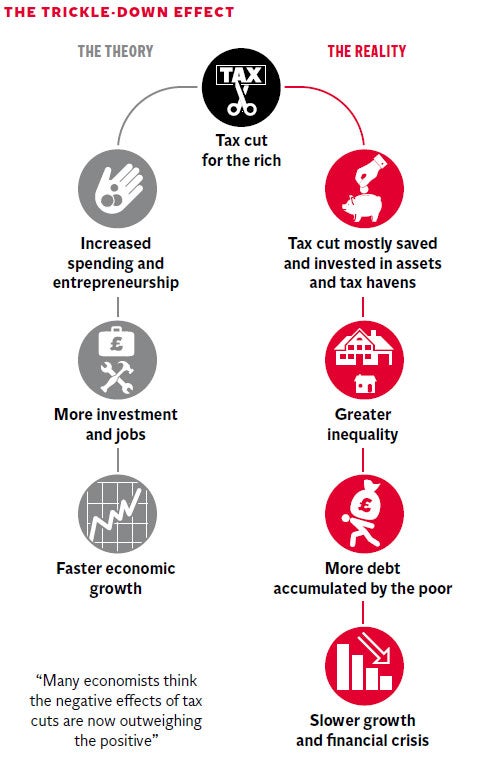The wealth that failed to trickle down: The rich do get richer while poor stay poor, report suggests
The free-market right promised cutting taxes for the wealthy would make us all better off. But new research suggests that when the rich get richer, the poor stay poor

It started out as a joke: “Money was appropriated for the top in hopes that it would trickle down to the needy,” quipped the American humorist, and one-time circus cowboy, Will Rogers, during the Great Depression. But in the 1980s, in the age of Margaret Thatcher and Ronald Reagan, politicians began to take trickle-down seriously. Or at least they seemed to do so.
Trickle-down can be (very loosely) characterised as the idea that reducing the tax burden on the well-off is, in the end, good for everyone. A wealthy person’s taxes are reduced and his disposable income increases. The wealthy person spends the extra income on a new mansion, or luxury goods, or lavish holidays. The estate agent, the luxury manufacturer and the tourist resort’s profits increase. Those firms then invest the profits, expanding their capacity, creating new jobs in the process. That additional investment boosts income and employment.
The economy grows, bringing in more tax revenues (more, indeed, than were forgone through the initial tax cut). The size of the state is reduced, the freedom of the population grows and general prosperity is enlarged.
Can it be true? Not according to Larry Summers and Ed Balls. The former American Treasury Secretary and Labour’s shadow Chancellor, in a new report produced yesterday by the Centre for American Progress, attempt to explode a bomb under this theory of a virtuous economic circle. “Left to their own devices, unfettered markets and trickle-down economics will lead to increasing levels of inequality, stagnating wages, and a hollowing out of decent, middle-income jobs,” the report argues.

To Summers and Balls, tax cuts for the rich do not inexorably result in more economic activity, but create a growing income gap between those at the top and those at the bottom. The rich tend to save more of their disposable income and growth slows down. Ha-Joon Chang, the popular economics writer from Cambridge University, is another veteran critic of the idea. “The trickle-down argument crucially depends on the assumption that, when given a bigger slice of national output, the rich will use it to increase investments”, he has written. He describes this as “an assumption that has not been borne out by reality”, and goes on: “Once you realise that trickle-down economics does not work, you will see the excessive tax cuts for the rich as what they are: a simple upward redistribution of income, rather than a way to make all of us richer.”
The remedy that Summers and Balls – and Chang – propose is: higher wages for ordinary workers, higher rates of tax on the super-rich and corporations, as well as a co-ordinated international closure of tax loopholes, with the money used to finance more public infrastructure investment.
It should be noted that parts of the libertarian right strongly deny the idea that it ever subscribed to trickle-down theory. “There is no record of any serious free-market thinker ever outlining that cutting tax rates on high earners is good because it encourages the rich to spend,” argues Ryan Bourne of the Institute of Economic Affairs think tank. “Free-marketeers don’t believe in low taxes because of their effect on spending. They believe in low taxes because they provide a strong incentive to earn more income in the first place.”
Yet how much incentive is necessary to motivate the less well-off and fuel economic growth? Many on the left would concede that the high marginal rates of income tax in the 1970s which were slashed dramatically in the Thatcher and Reagan era were excessive and discouraged entrepreneurship. Balls wants to reintroduce the 50p rate of tax, but he does not want to bring back the 75p top rate on earned income that existed in the 1970s.
But there is a growing sense that income inequality has reached excessive levels and is now holding back growth in many rich economies, rather than stimulating entrepreneurship. It is by no means only Labour chancellors and former Democrat official appointees who think so.
“A bit of inequality is good as it creates incentives for hard work and rewards entrepreneurship. Lots of inequality is bad, disenfranchises segments of society and erodes the social fabric,” says Mohamed El-Erian, the former chief executive of the world’s largest bond investment fund, Pimco. Harvard University’s Ken Rogoff, often cited by George Osborne as an economic authority, has said he thinks the United States needs more progressive taxation, particularly directed at the top 0.1 per cent.
There is also evidence that inequality can help create financial instability. Raghuram Rajan, head of India’s central bank and a former University of Chicago professor, argued in his influential book Fault Lines that rising inequality in the US created tremendous pressures on politicians to make cheap credit available to the low paid.
There are ominous echoes here in the UK. Despite his rhetorical assaults on high debt levels, one of Osborne’s most significant economic policies has been to offer state guarantees of private-sector mortgages in order to boost bank lending. The Office for Budget Responsibility has forecast that the ratio of household debt to incomes will surpass pre-crisis highs in the UK by the end of the decade.
What of the bigger picture? The right often point out that income inequality on a global level is falling, as emerging markets such as China and India plug themselves into the international economy. But in a report released today, the International Labour Organisation makes the point that inequality is also growing within many emerging economies, and that this is making high growth spurts less frequent, thus reducing the potential for incomes in these states to catch up.
Many are also pondering whether rising inequality is a natural result of free-market capitalism. Thomas Piketty’s best-selling Capital in the Twenty-First Century set the recent rise in Western income inequality in the developed world in historical context. He also posed the hypothesis that the tendency of the rate of interest on assets to exceed the rate of GDP growth means wealth is set to become ever more concentrated.
Crude trickle-down theory might well be a myth. But the idea that cutting tax for the rich is a sure-fire way to boost aggregate economic growth and living standards remains an article of faith among the Transatlantic right. And it is that proposition that Summers and Balls are setting out to challenge. They are not the first to do so, of course. But what’s different is that now, for the first time in a generation, the opponents of the orthodox right-wing view of the universal desirability of tax cuts have a strong intellectual tailwind.
Join our commenting forum
Join thought-provoking conversations, follow other Independent readers and see their replies
0Comments